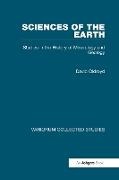En savoir plus
Table des matières
Contents: Introduction; A ’Geological’ Text from Antiquity: Science in the silver age: Aetna, a classical theory of volcanic activity; Early ideas about minerals and mineral analysis: Some Neo-Platonic and Stoic influences on mineralogy in the 16th and 17th centuries; Mechanical mineralogy; Some phlogistic mineralogical schemes, illustrative of the evolution of the concept of 'Earth' in the 17th and 18th centuries; An examination of G.E. Stahl's Philosophical Principles of Universal Chemistry; A note on the status of A.F. Cronstedt's simple earths and his analytical methods; Mineralogy and the ’chemical revolution’; Some 18th-century methods for the chemical analysis of minerals; Edward Daniel Clarke, 1769-1822, and his role in the history of the blow-pipe; The Earth, Method, and History: Robert Hooke's methodology of science as exemplified in his 'Discourse of Earthquakes'; From Renaissance mineral studies to historical geology in the light of Michel Foucault’s The Order of Things; Historicism and the rise of historical geology; By grid and group divided: Buckland and the English geological community in the early 19th century; Sir Archibald Geikie ( 1835-1924): geologist, romantic aesthete, and historian of geology: the problem of Whig historiography of science; Index.
Résumé
A series of papers on the history of mineralogy in relation to chemisty, from the Renaissance to the beginning of the 19th century. It considers philosophical ideas underpinning early thinking on minerals and earths, the ideas of Foucault and Hooke and the practicalities of mineral analysis.
Texte suppl.
'The usefulness of collections of papers like this one is well attested to, especially in a field such as the history of science where papers are published in a variety of journals, from the technical through those of the humanities, and across national borders...this is a fine collection of original and thoughtful articles, not only full of the results of extensive scholarship, but written in a way to inspire reflection on what it means to write history of science.' Metascience, Vol. 8, No. 3 'Sciences of the Earth is...of great use and value for historians of geology and also for historians of science in general...every article can still be read with great profit.' Annals of Science, Vol. 57 '...a thought-provoking and stimulating book.' ISIS '... widely welcomed...' Ambix

